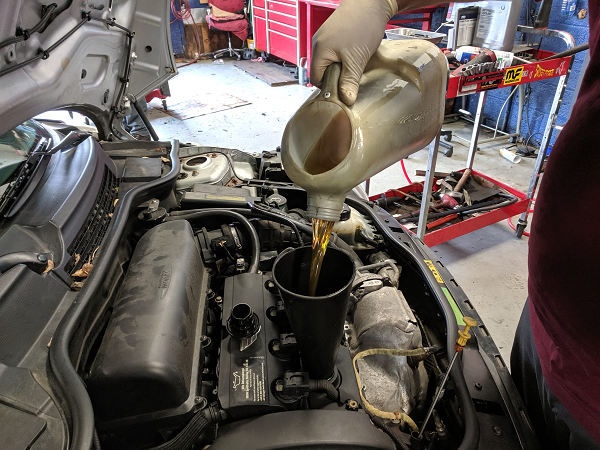Late model BMW automobiles have dealer-recommended 10,000-mile synthetic oil change service intervals. That is all well and good when the engine is brand new and still under warranty,, where if anything breaks, clogs, or is damaged the dealer will take care of it under warranty. Also good for BMW corporate as they don’t have to do many oil changes under warranty. 10,000 oil change intervals get really dicey once your BMW is out of warranty and has racked up tens of thousands of city miles in stop-and-go traffic. Waiting 10,000 miles between oil changes comes from BMW testing their brand-new engines under ideal driving conditions. A mix of highway, town, and city driving are tested on a new engine with all new seals and parts while under warranty. Now, if your car is at least 10 years old, nearing 100,000 miles, and spends most of your commute idling and revving up in stop-and-go traffic then 10,000-mile oil change intervals will cause premature wear. This will lead to leaks and premature component wear at the least or will cause engine failure at worst.
Oil has many jobs inside your BMW’s engine, and becomes less efficient at performing those jobs the more miles the oil has been cycled through your engine. Oil works to cool, lubricate, and clean critical components. As oil is cycled through your engine to perform these jobs, it starts out a golden amber color, and as it picks up contaminants and moisture and oxidizes through heat cycles, it turns black and becomes thicker. As oil deteriorates, it loses its ability to withstand high temperatures without burning. Once your oil’s tolerance for heat is reduced enough, it will burn, causing sludge to build up and greatly increasing wear and tear. This is a common problem with the BMW N20 engine installed in the BMW X1, X3, 3 Series, and 5 Series automobiles. Following the 10,000-mile oil change service interval on cars equipped with the BMW N20 engine causes excessive wear on plastic timing chain tensioners. They will suddenly fail, and the engines will internally destroy themselves when this happens. This issue was so sudden and widespread that there was a class action lawsuit against BMW for this issue.
Engines experience the most wear, and oil has to work the hardest during cold starts and stop-and-go traffic. That is why oil deteriorates faster in city driving, where your car’s engine is constantly starting, than driving short distances with lots of idling and quick accelerating in between. Oil lasts the most miles in environments where the engine revs at a constant low RPM with lots of air passing through the radiator, keeping everything at optimal temperatures. Our customers’ cars tend to do the bulk of their driving in the city, and therefore, we recommend oil change intervals of 6,000 miles with synthetic oil. What if you drive your car less than 6,000 miles a year? Then, we recommend that you change your oil once a year. As oil sits in your engine, moisture builds up in the oil pan and oil oxidizes, becoming less effective.
6,000-mile oil change intervals are cheap insurance against premature engine component failure. And when you get your oil changed at a reputable shop like Bimmer Motors, you also will get a heads up in case something is worn, leaking, or we see something that might become a maintenance issue down the road. European luxury cars, including BMWs, are not cheap to repair, but keeping up with standard preventative maintenance in a timely manner goes a long way to saving yourself from large repair bills in the future.


Leave a Reply